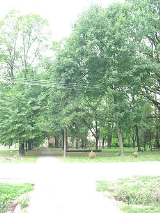
Krajišnik
Encyclopedia
Krajišnik is a village in Serbia
. It is situated in the Sečanj
municipality, Central Banat District
, Vojvodina
province. The village has a Serb ethnic majority and its population is 2,241 people (2002 census).
, the village is known as Krajišnik or Крајишник, in German
as Stefansfeld, in Hungarian
as Istvánfölde (until 1890 Stefanföld), and in Croatian
as Krajišnik. The name is derived from the word Krajina
, and means "a resident of Krajina".
Its former name used in Serbian was Šupljaja / Шупљаја. This name is found in the records since 1660.
Serbia
Serbia , officially the Republic of Serbia , is a landlocked country located at the crossroads of Central and Southeast Europe, covering the southern part of the Carpathian basin and the central part of the Balkans...
. It is situated in the Sečanj
Secanj
Sečanj is a village and municipality in Central Banat District of Vojvodina, Serbia. The village has a population of 2,645, while the Sečanj municipality has 16,298 inhabitants.-Name:...
municipality, Central Banat District
Central Banat District
Central Banat District is a northeastern district of Serbia. It lies in the region of Banat, in the autonomous province of Vojvodina. It has a population of 208,456...
, Vojvodina
Vojvodina
Vojvodina, officially called Autonomous Province of Vojvodina is an autonomous province of Serbia. Its capital and largest city is Novi Sad...
province. The village has a Serb ethnic majority and its population is 2,241 people (2002 census).
Name
In SerbianSerbian language
Serbian is a form of Serbo-Croatian, a South Slavic language, spoken by Serbs in Serbia, Bosnia and Herzegovina, Montenegro, Croatia and neighbouring countries....
, the village is known as Krajišnik or Крајишник, in German
German language
German is a West Germanic language, related to and classified alongside English and Dutch. With an estimated 90 – 98 million native speakers, German is one of the world's major languages and is the most widely-spoken first language in the European Union....
as Stefansfeld, in Hungarian
Hungarian language
Hungarian is a Uralic language, part of the Ugric group. With some 14 million speakers, it is one of the most widely spoken non-Indo-European languages in Europe....
as Istvánfölde (until 1890 Stefanföld), and in Croatian
Croatian language
Croatian is the collective name for the standard language and dialects spoken by Croats, principally in Croatia, Bosnia and Herzegovina, the Serbian province of Vojvodina and other neighbouring countries...
as Krajišnik. The name is derived from the word Krajina
Krajina
-Etymology:In old-Croatian, this earliest geographical term appeared at least from 10th century within the Glagolitic inscriptions in Chakavian dialect, e.g. in Baška tablet about 1105, and also in some subsequent Glagolitic texts as krayna in the original medieval meaning of inlands or mainlands...
, and means "a resident of Krajina".
Its former name used in Serbian was Šupljaja / Шупљаја. This name is found in the records since 1660.
Historical population
- 1869: 2,329
- 1900: 2,344
- 1948: 3,926
- 1953: 3,733
- 1961: 3,357
- 1971: 2,712
- 1981: 2,495
- 1991: 2,428

